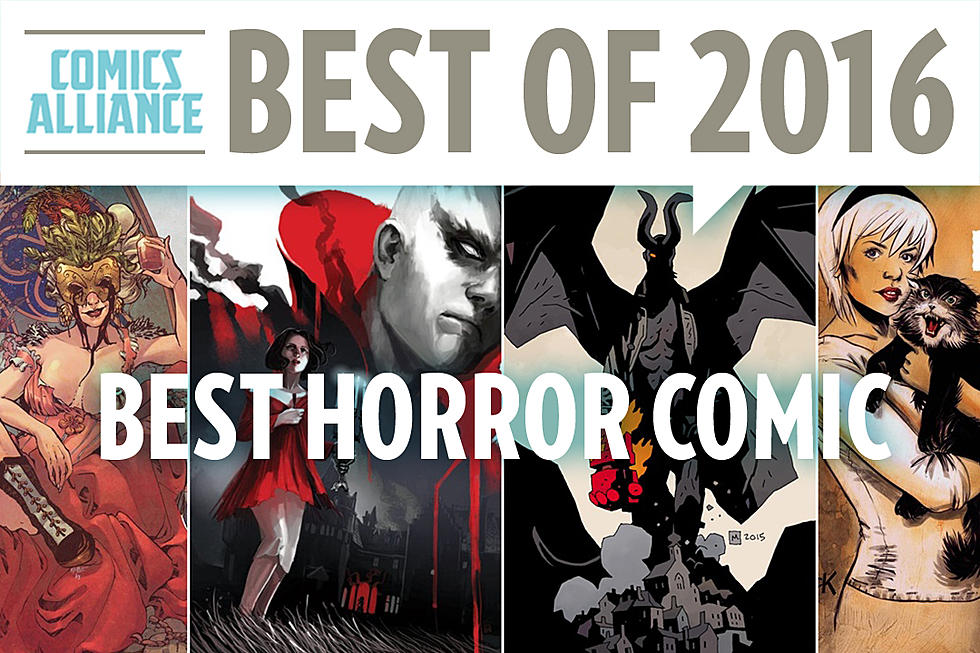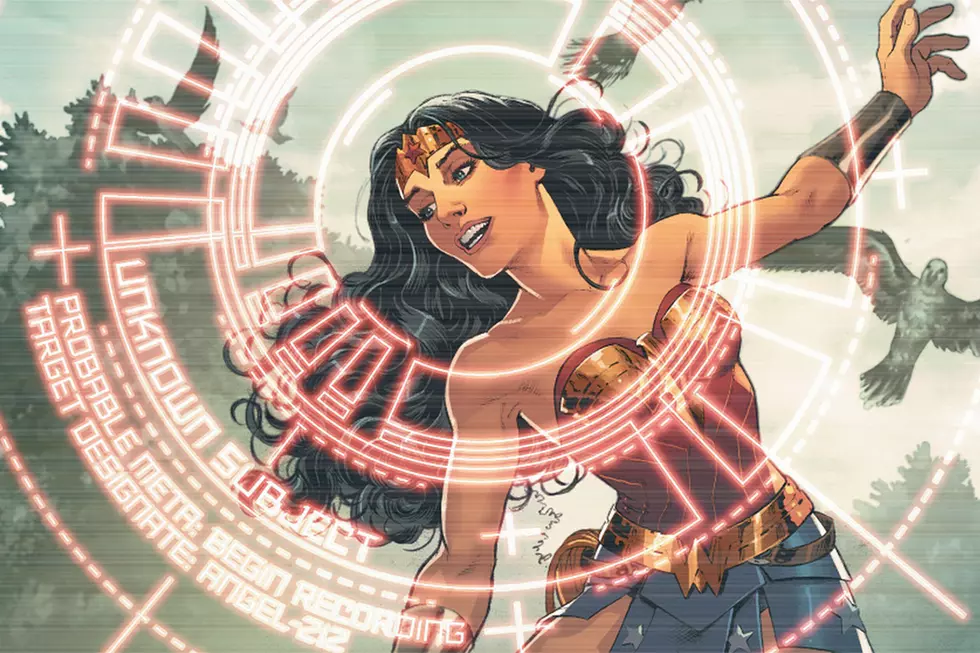
Renee Was A Character I Wanted To Keep Using: Greg Rucka on The Question, Part One
If there's one great thing we've gotten out of DC's Convergence event, it's that it has provided a unique and welcome opportunity for creators to return to characters from a very specific time, giving them one more opportunity to set a few things right and give readers a little bit of fanservice along the way. For me, the most anticipated part of that was being able to see Greg Rucka return to Renee Montoya alongside artist Cully Hamner in Convergence: The Question.
To mark the occasion, I spoke to Rucka about his return to the Question, following up on our in-depth interview about Batman and Gotham Central. We discussed his history with the character, and how Renee Montoya transitioned from the role of cop to superhero, in part one of our two-part interview.
ComicsAlliance: The first time you wrote about the Question was in Batman/Huntress: Cry For Blood, with Rick Burchett, I believe.
Greg Rucka: That was the first time I used Charlie.
CA: Right, it was Vic Sage --- Charles Victor Szasz --- and Helena Bertinelli, and there was a strong influence in that story from the Denny O'Neil/Denys Cowan run on The Question from the late '80s.
GR: Yeah. I wrote that when Denny was still group editor. I had gone to him and said, "Can I do this?" and he said, "Yeah." That was with the master over my shoulder, so to speak.
CA: Being a fan of that run, especially that first arc and, if you want to get right down to it, that first issue, I have to imagine that was something that you were a fan of even before you were writing at DC.
GR: Oh, God yeah, and in all honesty, one of the first conversations that I ever had with Denny was when we went out to lunch and we were talking about that run and my interpretations of what had been going on in it, and a lot of the thematic things that he'd been working with that are in it. That run is a treatise on many things, but one of the things that it very clearly is about is, how do we define sanity? What is behavior that is "insane" to the majority is perfectly rational to the people who are performing it, and why that is. That was something he was very cleverly working with.
CA: It makes sense that he would be, too, because that's Batman in a nutshell.
GR: Yeah. I think that was probably an inevitable outgrowth of work that he'd been doing there. [Laughs]
CA: In that story, you tie the Question to Helena Bertinelli, the Huntress, and it's really interesting because of how it mirrors that first arc where the Question goes and finds enlightenment and learns how to be a better superhero, and Helena... does not.
GR: Well, understand that I was not the only person to be writing her. My memory, and we're talking about something that's fourteen years old now, is that I wanted to show that what works for Charlie doesn't work for everyone else. Helena was never willing to let go of that anger. That's why it's called Cry For Blood, her motivation is a different motivation. Charlie's motivation becomes the question, right? That's what he is. That's the change. He's a guy who, when we meet him in the run, is kicking ass and taking names because he gets kicks out of it. He'll argue that he's doing it or a higher purpose, but the fact of the matter is that he enjoys it. He likes being able to put the beatdown on somebody. It's Richard Dragon who basically says "Nah, that can't be it."
That interaction with Richard doesn't change him, but it presents a different way of looking at it. Charlie then leaves, now knowing that the violence is not the end, it's a means. It's something in his skill set that he's going to be using. This sounds very vague and portentous, but it's just another tool in the toolbox to find answers. Helena doesn't have any interest in putting that down. She knows what her mission is. She's on point. She's never been into it for the kicks or the violence, she's there because she wants payback, and she's going to get it. So Charlie didn't do a good job of identifying his student, I think.
CA: That run on The Question is, in a lot of ways, a run about learning to let go. Even when you get to the end, the end of the book --- spoiler warning --- is the Question and his girlfriend deciding, the hell with it, and leaving Hub City because they've come up against an obstacle that they can't change without letting it change them, so they let go of it. It seems really depressing when you read it, but it follows from those first issues and the idea of letting go. With the Huntress, well, it's right there in their names. The Question and the Huntress.
GR: They are who they are. They are sincere. They stick to their designs, I think. You know, I love Helena. I love that character, I think she's a fabulous, fabulous character, and putting her opposite Charlie, you can't help but see that conflict in personality and approach. Dramatically, if nothing else, that's gold. You'd be a fool to pass that up.
CA: Was the Question a character that you wanted to return to after Cry For Blood? It seems like it was a long time before you got to Renee Montoya and the Question.
GR: It was five or six years, which is a long time in publishing. The thing is, Charlie was being used elsewhere and I was working on different things. Denny left, and there had been, I believe, a whole plan to sort of reboot the Question over at Wildstorm and things like that, so every time I'd circle back around and say, "Is anything going on? Can I use him?" I would be told, "No, no, somebody's doing a thing." It was not for lack of trying.
It wasn't until we hit 52, when we kind of had the keys to the kingdom simply by dint of the nature of that project, where I was able to say, "Okay, this is a good character for what we want to tell. Can we use him?" and the answer came back, "Yeah, you can." Prior to that, it hadn't been out of a lack of desire, I assure you.
CA: Going back a little bit, let's talk about Renee. Obviously, she was introduced on Batman: The Animated Series, and then quickly made the jump into comics. What was it that drew you to her? You used her really prominently in Detective Comics, even before Gotham Central.
GR: As a matter of fact, she's the first character I wrote for DC. The first thing I wrote was "Two Down," which was a Renee story. it was the start of the Two-Face stuff.
I'm not sure I can put a finger on it and say it was one thing or another. I had met her the way almost everybody else had at the time, on the Animated Series, and I liked and remember responding to the fact that here was a woman of color who was a good cop in Gotham. That had resonance for me, and then when she jumped into the books, she had even more resonance. She was fairly unique at that time, there were not a lot of women who were saying things and doing things rather than just standing around being scenery or props.
I'm not sure what it was, but I felt early on that I knew who she was. I had an idea for a backstory that there was no evidence for at all. There's no evidence to support that she has living parents, that she has siblings, any of those things. I just felt very strongly and almost immediately that these things made sense for the character, much in the same way that I identified her as queer almost immediately.
I knew she was gay, and over the years that has gotten me no end of flak. You know, "Oh, she went on dates, she was seeing someone," and my response has always been, "Yes, well there's a thing called bearding. Some people may have heard of it." Just because she's going out with a guy doesn't mean she's not queer. Again, I wish I could say I knew why. I had an immediate, intuitive connection to the character and, God help me, that way damnation lied, or salvation. But that's the way it went.
CA: Obviously, you focus on her as a cop for years, starting with No Man's Land and up through Detective and Gotham Central. Was there always the idea that you wanted to make her a superhero?
GR: No. In point of fact, I was very resistant to it for a long time. It was something that came out of work on 52, and I remember very distinctly having a conversation with Geoff Johns about both Renee and Cris Allen. I had always known, from early on in Central when Ed and I were talking about the story, where Renee was going to end up. At that point, the names "The Question" and "The Spectre" had never entered into conversation. It was Geoff who came and said, "You know, Cris being the new Spectre would be pretty awesome," and I kind of went, "Ehhhh, sure."
I wish I could remember the conversation verbatim, and obviously I can't, but he argued, and I actually came around on this because it's a very persuasive argument, that this is a superhero universe. That's what these stories are, fundamentally, we tell stories about superheroes. To not take these characters to that level, to not expose them to the larger sense of the DCU, is arguably denying them and denying the larger world of them.
I was kind of like, "Eh, I'm not sure I buy it," and the more I thought about it, the more I came around to not only thinking that he was right, but also thinking about something Kieth Giffen was saying at the time as well. Keith has always maintained this, and I think quite rightly, that every time you take something out of the universe, you need to put something back in to replace it. One of your duties, when you're writing comics in a shared universe like that, is not to diminish it, but to continually expand it and grow it.
Both of those arguments took for me. That was when I turned into it. If my memory's correct, we did it with Cris first, but like I said, this was a while ago. I'm old, and my memory fades. But we did know, and I've talked about this elsewhere, too, that when we were doing 52, the choices that we made were not solely on the basis of, "I love this character, this is the character I want to write about," and so on. We made our choices very strongly based on the stories that we knew we wanted to tell, and those stories were all thematic ones.
We wanted to talk about death in the DC Universe, and how some people go to get a pass and come back, and some people didn't. That opened up a whole other topic about legacy. We wanted to talk about what was required to be a hero, what were the elements of true heroism? Could we counterpoint that with refusing it? Things like that. It was in those conversations that, because Central had just ended, Renee was a character that I wanted to keep using. I had more story for her.
I wish I could remember who it was who said "We should bring the Question in and put the two of them together." On paper, they got on like a house on fire, so how could you not?
CA: Was it like it was with Helena, where the characters came from different backgrounds and just played off each other well? Was there any struggle when you sat down to write them?
GR: Oh, God no. [Laughs] It was rather depressingly easy to write them together. I remember that Geoff, at one point, was writing them for a couple issues for something he was doing, and I remember him calling me up and going, "Wow, they're great! They're a lot of fun to write!" and I was like, "Yeah, I know!" There was something in their interaction from the get-go, where they both seemed to compliment and feed each other. You get Butch and Sundance together, and... there's a reason they did Butch And Sundance: The Early Days. "That was really good, let's do it again!"
We knew from the start, once we settled on it, what the arc was going to be. We knew where Charlie was going to be at the end, and we knew where Renee was going to be at the end. We didn't necessarily know the actual beats of the story, but we knew that Charlie would be passing the mantle to her.
CA: Was there ever a thought, before you settled on Renee becoming the Question, of tying her closer to Batman through a Batman legacy, even if it was something as distant as what you did with Kate Kane and Batwoman?
GR: I don't actually remember that being something we seriously considered. I suspect if it had come up, I would've resisted it very strongly. By dint of what the Question identity was, and what Denny had done, you were loosely affiliated with the Bat-group anyway. The idea of her falling under that umbrella, was never something I considered or wanted, and I suspect that if somebody else had mentioned it, I would've argued against it quite strenuously.
I think the Bat corner of the universe is grossly overpopulated anyway. I think that Batman loses his efficacy and mythology if he's got too many people around him. That's what the Justice League is for, you know what I mean? [Laughs]
CA: Oh, Greg. I don't have time to have this argument with you right now!
GR: You know what, Chris, I know you hold yourself up as the authority...
CA: [Laughs]
GR: I will happily have this argument with you, but I think Batman is boring as hell at this point, in so many ways. It's one of the reasons why I'm far more interested in looking at him through someone else's eyes. I think Batman has the Wolverine problem. I think he's overexposed. Same thing with the Joker. That's not to diminish stuff that's been doing with him now, or that has been done with him since then, but I think he suffers from being a guaranteed sale, and when you have a corporation where the primary goal is to make money, well, there's a reason that you're going to have that many Bat books.
CA: As a character, I feel like he certainly would've overshadowed Renee in a way that the Question would not.
GR: Well, you gotta also remember that when Denny wrote the Question and Batman together, Batman was a total prick. They don't get along. And their agendas, mind you, are very different - very different. Charlie would let a criminal walk if he thought it would get him the answer he wanted. Batman would s--t a brick.
Next: Renee Montoya becomes the Question, and Rucka returns for Convergence.
More From ComicsAlliance









